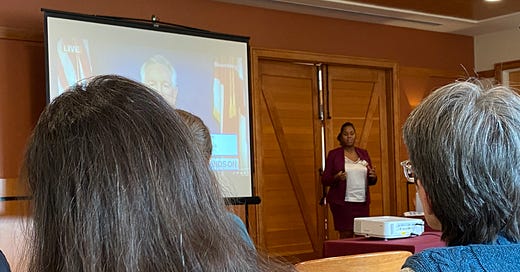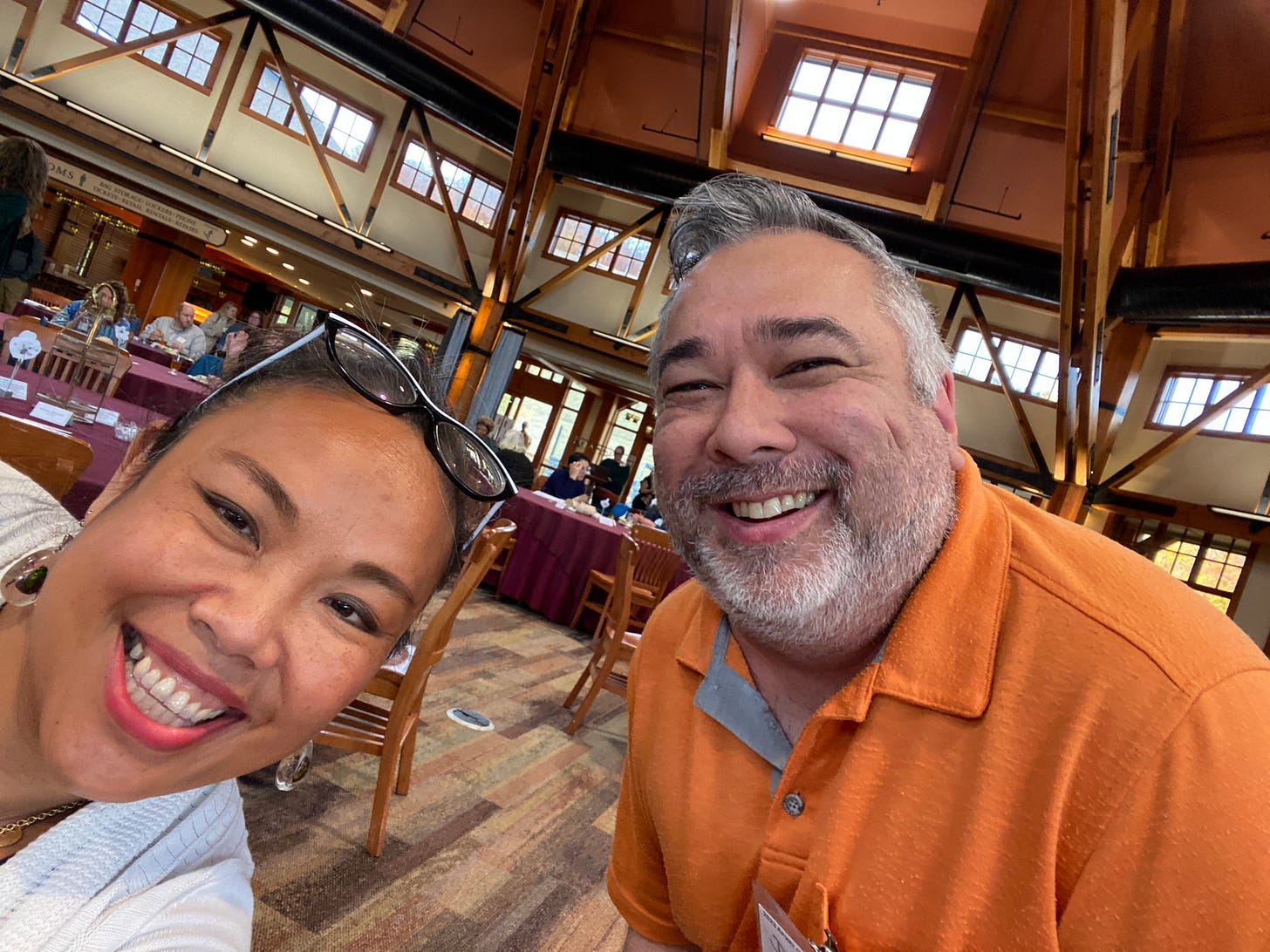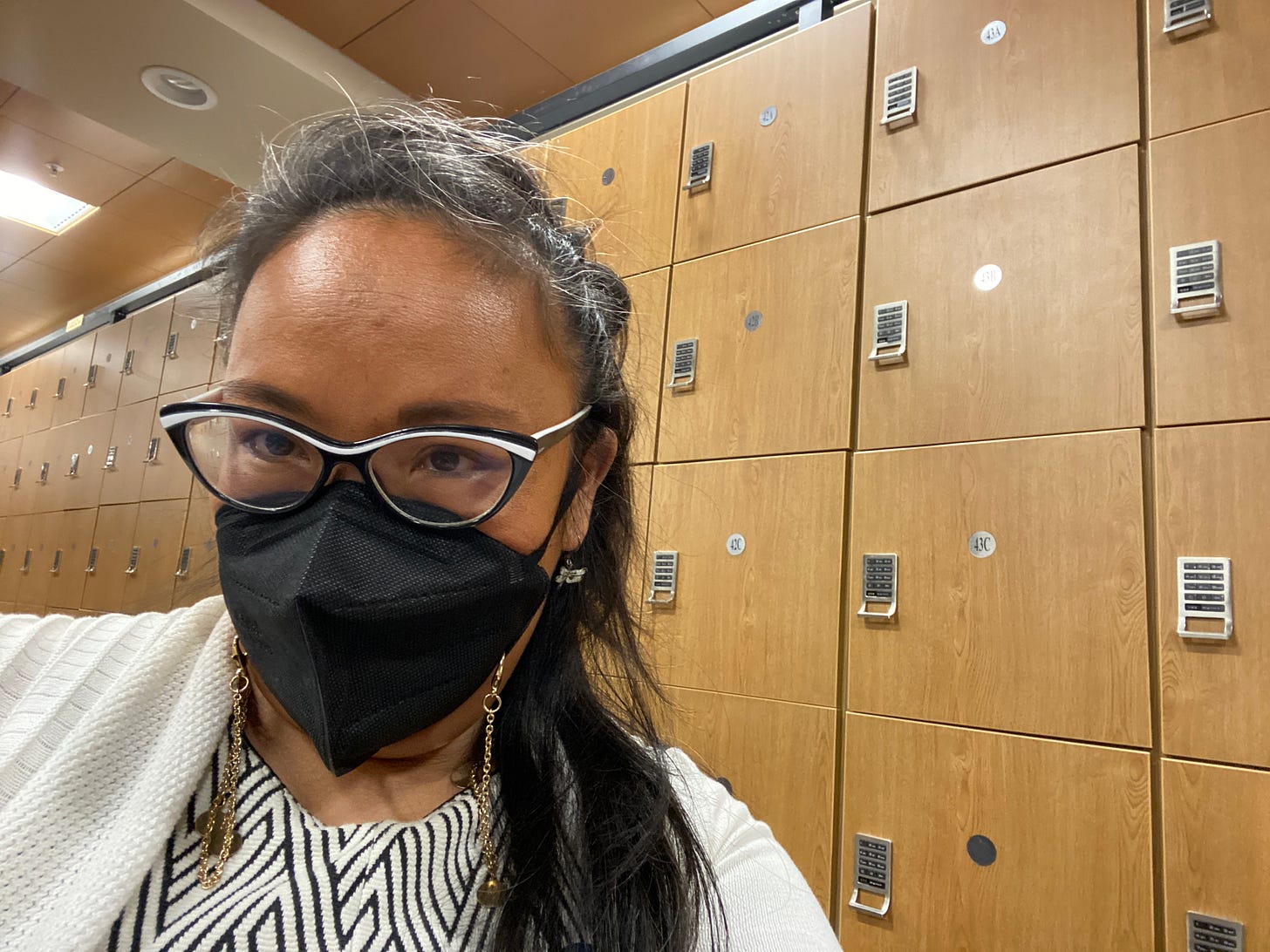Last week I attended the Apiary for Movement Builders conference organized by the Office for Racial Equity for the state of Vermont. It was a last minute decision and I’m glad I had the flexibility to do so. Not only did I have an excuse to experience Spruce Peak Village (since I don’t ski, my chances have been limited), but I also was able to meet up with old and new friends with whom I feel my current work is aligned.
And when I say “work,” I mean the whole mix—-the dreaming and scheming, the phone calls and meetings taken and the calls for support and calls for action. For me, this is unpaid work. Where I can, I insert it into my professional life too.
I don’t consider myself part of any collective “movement”—-no one was organizing me, my thoughts or activities. But as an active participant in society, I recognize that I am part of something. Maybe it’s the GenX in me that refuses it. But maybe it’s that I hadn’t found my place in it. This conference helped me to find a little foothold and I’m glad for that. While my work may not be in direct collaboration with others, it still benefits and is part of the whole. I collect my own nectar and add it to the collective’s honey reserves.
Funny, all this time I thought that if I were part of a “movement,” I’d be behind the scenes, preferably in the kitchen, feeding folks like Georgia Gilmore or the Black restaurants of the South did during the Civil Rights era. Instead, I’ve found myself doing what I’m prone to do: to think deeply and write.
This was made abundantly clear to me during the conference breaks when several folks introduced themselves and expressed appreciation for my writings, most notably the one about the Agency of Agriculture’s tourism videos. It helped me to better understand my “place in the family of things,” to invoke Mary Oliver.
Here all this time I was waiting for a movement to join only to find I’ve been absorbed into one. Here I was thinking I’d feed our bodies instead of our minds. Here I am just being me and belonging.
Anyways, I missed Lt. Governor Zuckerman’s opening remarks the first day and skipped Baratunde Thurston’s appearance on the second day, but there was already so much that I’d absorbed.
Here are a few things I’m taking away from the sessions, networking, and side conversations.
“BIPOC” is a leaky umbrella
It’s unrealistic that a simple 5-letter acronym could be inclusive enough to capture the entirety of the global majority. BIPOC, which stands for Black, Indigenous, People Of Color, has become a socially normalized term used to identify non-white people, especially in conversations about diversity and inclusion.
It’s problematic for two main reasons: it’s not a federally-recognized category. The US Census for example has 5 race categories. These collected demographics are used to determine federal funding, social programs, and are in reported data analyses. These categories together could be considered “BIPOC”, but BIPOC will never be able to accurately represent these groups. It’s too disparate a group for one umbrella term.
The vogue in this current climate of diversity and inclusion is to cater to the “BIPOC” or “underserved” or “minority” groups. These terms are all too vague to be meaningful. BIPOC does not carry a set language or defined cultural norms or expectations. We must define ourselves using specific terms, as unhyphenated and uncompromised as possible.
For instance, I introduce myself as a Laotian refugee living in Vermont, USA. It is more specific than Asian American, than BIPOC. In this specificity, we have groundwork for certain questions and conversations that might not arise if this was not disclosed.
Think about your identities and the ways you present to yourself and why. What are you trying to say or not say when you emphasize certain identifying factors over others? It shapes how others perceive you and the interaction that ensues.
Here’s a simple DO and DON’T for the purposes of grant writing, activist work, and government programs:
❌ “Our goal is to help BIPOC students from low income families succeed in the classroom”.
✅ “Our goal is to work with Spanish-speaking children from low income families to improve their English proficiency.”
BIPOC is too diluted a demographic to target. There are too many factors to account for. Be specific.
The second reason that the term BIPOC is problematic is that it is rooted in white-centeredness. When we talk about diversity and inclusion with the language of white centeredness, we are still othering the non-white groups and thereby devaluing the identities because it upholds whiteness as the norm by which others are compared. To correct for this, the most egalitarian thing to do would be to name the cultural background of a person.
❌ “Our staff is 25% BIPOC”
✅ “Our staff hails from the communities that we serve, which include Cambodian immigrants and newly arrived Somalians.”
We’re all doing intake
Whether we’re signing up a client for a coaching session, helping a friend apply for a housing voucher, or selling seats to a fundraising gala, we are at the initiation stage of data collection.
Often we think of data in terms of national or global aggregate or in terms of Google and Meta mining our personal information for world-domination purposes.
But data is just information. Personal data is information about ourselves. In these modern times, there’s no shortage of forms we have to fill. We are always disclosing parts of ourselves, sometimes very sensitive private information. In our work, when we ask it of others, we need to be mindful of how we do so and create frictionless processes so that as many people can participate as possible.
For example, my team at the Green Mountain Film Festival is setting up screening tickets and will be incorporating accommodation requests at the point of sale, which will include booking a wheelchair-accessible seat, allowing permissions for guide animals or personal care aides as well as requests for ASL interpreters for panel discussions. Incorporating this on the front end of the ticketing platform will allow participants to select the accommodations they need without forcing them to take the extra step of a separate inquiry. Placing this front and center will also show folks that these options exist, and that they are welcome to request them. Here is some of the federal guidance we will be using.
Equity is inherently unfair
Because we are not born as equals and the systems we’ve designed are far from just, equity in practice is not the same as equality.
“We cannot do our jobs effectively without courage, and courage includes doing what is right even when it goes against what society believes to be fair, even when others get on our case. Our work is not to be fair. Our work is to restore balance where we can, and we cannot do that if we constantly prioritize being “fair” to those who historically have had more privileges and resources.” - Vu Le, Nonprofit AF
This seems like a no brainer here. There are folks who will need more assistance than others in order to participate and that’s okay. Some folks are made to pay more than their full fare for a chance at a decent life. We should welcome and encourage those chances they get for some easing of charges that are never levied upon those with more privileges. It’s only fair.
There were many folks in attendance from many aspects of government, from elected leaders to workers across departments to us interested community members. It cut a wide and colorful swath. There was a palpable sense of common understanding and togetherness in the air. Even I, who traveled alone and whose work barely intersects with anyone else’s, felt welcomed and part of the movement.
The sessions were smart, dense and forward-forming. Meaning, the takeaways were meant to support our collective work ahead. And that’s the biggest buzz.
Slide decks will be uploaded here by Nov. 6th.
My photos above:
Xusana Davis, executive director for the Office of Racial Equity giving a talk about media representation and narrative forming
You never know who you’ll see: had lunch with Danny McGibney, one of several equity liaisons for the state.
One of many worker bees, yours truly.
For my two dozen premium subscribers, I’m adding a quick put-together that I brought to a Halloween-themed party this past weekend. I call it a “put-together” rather than “recipe” because there’s no scratch cooking involved. This was a kitchen forage for bits and bobs that came together really quickly. I call them Boo Cheese Bites. Upgrade to premium with a paid subscription here or with a tip on my Ko-fi page. Enjoy!






